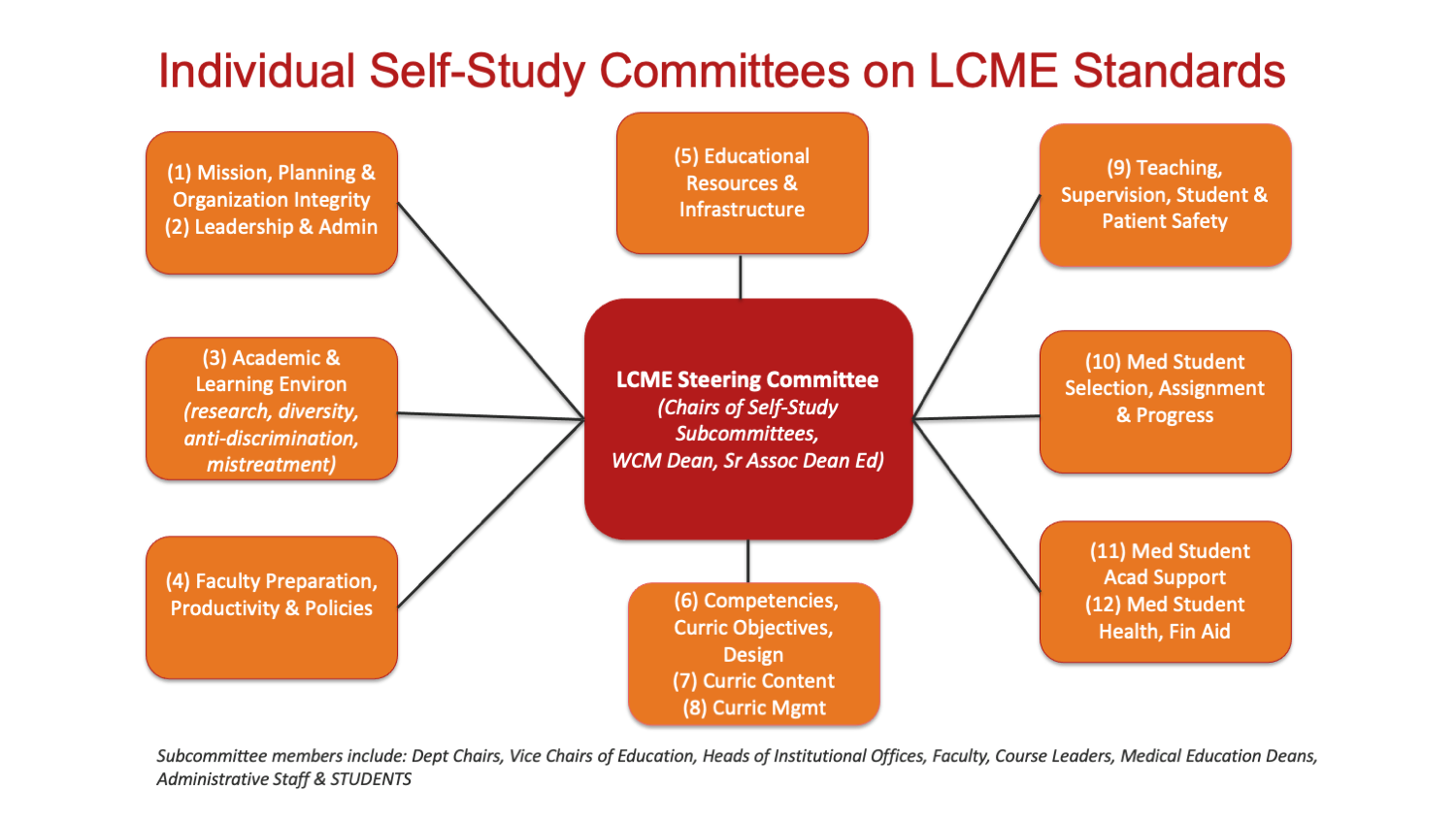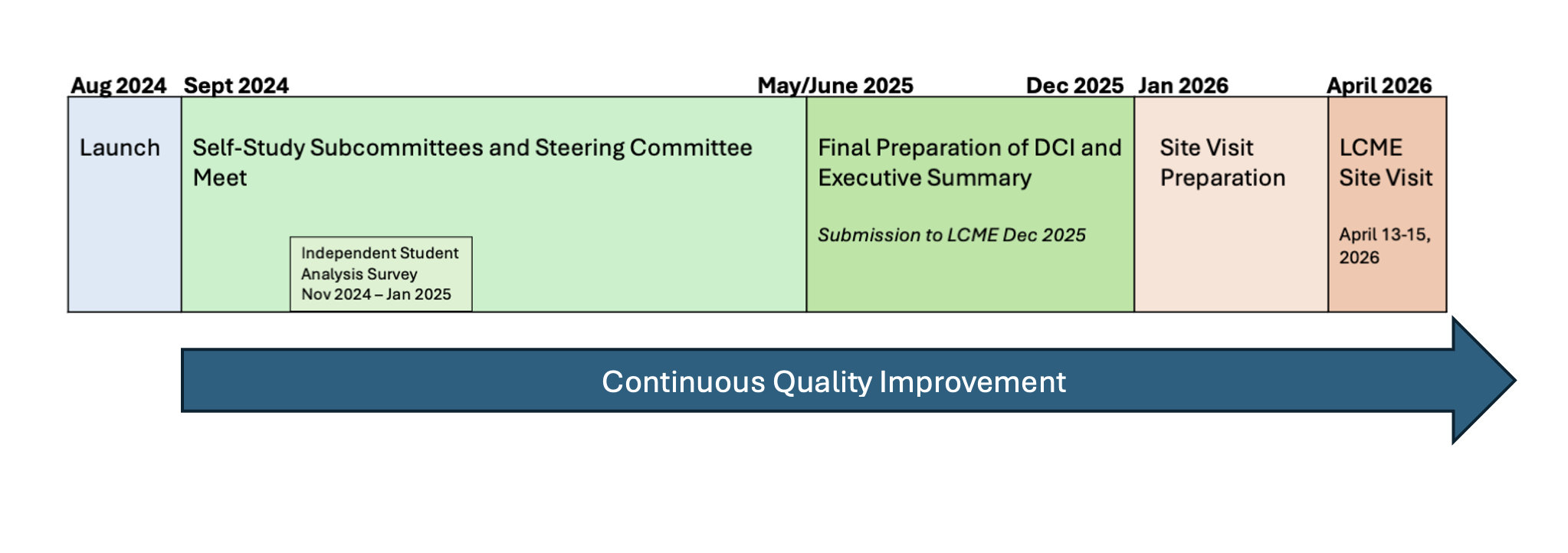WCM received full accreditation status from the LCME in 2018. Accreditation can be verified by the LCME/LCME Secretariat on the LCME website, by emailing lcme@aamc.org or by other options listed on the LCME contact page.
Weill Cornell Medicine’s next LCME Accreditation Site Visit is scheduled for April 13-15, 2026
Message from Dean Harrington
What is LCME Accreditation?
The Liaison Committee on Medical Education (LCME) is the recognized national authority for the accreditation of medical education programs leading to the M.D. degree in the U.S. and Canada. Sponsored jointly by the American Medical Association (AMA) and the Association of American Medical Colleges (AAMC), the goals of the LCME accreditation process are to certify that a medical education program meets established national standards (quality assurance) and engages in ongoing institutional and programmatic quality improvements.
More information is available on the LCME website: https://lcme.org/
Why is LCME Accreditation Important to Weill Cornell Medicine?
Maintaining full accreditation is important to meeting our mission as a medical school; specifically, to attract the best and brightest of faculty and students (Discover and Teach) and to retain our reputation of providing the highest quality of care for our patients (Care).
To maintain accreditation, a medical education program must meet the LCME accreditation standards and demonstrate that its graduates exhibit professional competencies appropriate for entry to the next stage of their training.
For Medical Students
- Eligibility of U.S. students in MD-granting schools to take the United States Medical Licensing Examination (USMLE) requires LCME accreditation of their school.
- Graduates of LCME-accredited schools are eligible for residency programs accredited by the Accreditation Council for Graduate Medical Education (ACGME).
- Most state boards of licensure require LCME accreditation as a condition for licensure of their graduates.
For the Medical College and Its Faculty
- Accreditation by the LCME establishes a U.S. medical school’s eligibility for selected federal grants and programs.
What is the Institutional Self-Study?
The Institutional Self-Study brings together all members of the Weill Cornell Medicine academic community (students, faculty, staff) for the purpose of identifying the college’s strengths and areas that would benefit from improvement and also ensuring that the college meets all current LCME standards.
As part of the Self-Study process, students, faculty, and staff work together in eight Self-Study Subcommittees, each of which addresses one or more of the twelve LCME Standards. Over the course of academic year 2024-2025, these subcommittees meet to analyze relevant data and formulate responses to questions associated with each accreditation standard.

What Data Are Analyzed During the Institutional Self-Study?
The data that are analyzed as part of the Institutional Self-Study are wide ranging and generated from many different offices throughout the medical college. While the LCME is particularly focused on the curriculum, student admissions and advancement, and educational outcomes, it also requires that we review inventories of resources such as finances, space, student services, faculty productivity, and the learning environment including clinical settings.
The LCME places an important value on student feedback. Accordingly, the Self-Study Subcommittees will review the confidential results of annual internal student surveys on the quality of the curriculum and the medical education program. They will also review the annual Graduation Questionnaire (GQ), administered by the Association of American Medical Colleges, which compares WCM’s results against the national benchmark of all U.S. medical schools.
As part of the LCME Self-Study, medical students are required by the LCME to form a student-led task force to create a survey tool that is administered to all classes (M1-4 and MD-PhD students). The survey known as the Institutional Student Analysis (ISA) covers a wide range of topics including curriculum, student services, learning environment, research opportunities, advising and career counseling, resources, and facilities, including housing and dedicated-student space. It includes questions that are required by the LCME and those that are designed by the students to address other areas of particular importance to them.
What Documents Are Submitted to the LCME?
A central focus of the Self-Study Subcommittees and the Steering Committee is the LCME’s Data Collection Instrument (DCI). This document is organized by the twelve LCME standards and the elements that comprise each standard, totaling 93 elements. The standards cover all aspects of the institution including its mission and leadership, learning environment, curriculum, faculty, admissions, and student services. Within each element, schools are required to complete data tables, respond to specific questions about policies and procedures, and provide supporting documentation for that element.
At the end of the Institutional Self-Study process, WCM will submit a completed DCI, ISA, and an Executive Report that summarizes the strengths of the school and strategies to improve and/or enhance specific areas identified in the Self-Study.
The documents will be submitted to the LCME in the late fall of 2025 in advance of the LCME Site Visit, April 13-15, 2026.
 Continuous Quality Improvement (CQI)
Continuous Quality Improvement (CQI)
Weill Cornell Medical School is committed to the systematic data-driven approach to identifying areas for improvement across the learning environment related to medical education. CQI efforts are currently conducted within the LCME self-study committees but will continue annually in the years after the LCME site visit as described in WCM's CQI policy and medical education governance document.
LCME Contact Information
Email: lcme@aamc.org
Mailing address:
Association of American Medical Colleges
655 K Street NW, Suite 10
Washington, DC 20001-2399

